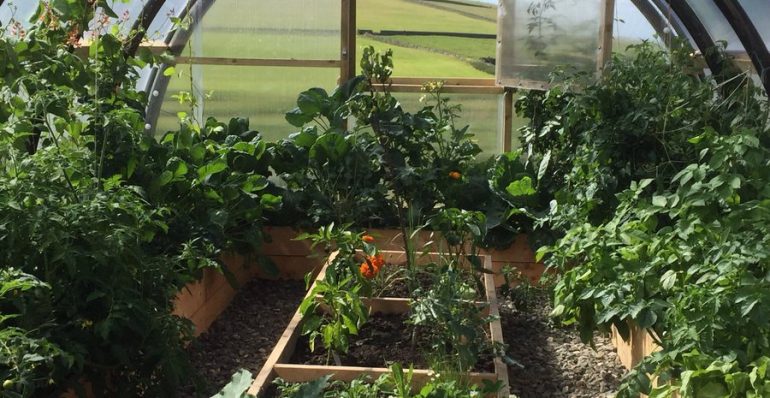
A community Polycrub scheme

21 Jan 19 |
By Dr Susan Bowie, GP Hillswick Health Centre, Shetland Islands
Note from the Editor
Increasingly, communities are recognising the value of gardening as a route for increasing physical activity, getting fresh air, distraction from life’s challenges, social interaction and taking positive action towards a more plant based diet. Several trials 1,2 are now underway on the benefits of gardening for cancer survivors as well as the general population. The North of Scotland may seem inhospitable to all year round gardening but where there is a will there is clearly a way ….
A new community Polycrub scheme (a polytunnel/greenhouse structure) has been constructed in the northerly village of Hillswick on the Shetland Islands using recycled salmon farm piping and polycarbonate twin wall sheeting to withstand even the wildest of Shetland weather. Hosted by the local health centre it aims to provide a green space to let patients, who otherwise wouldn’t have access to an area to grow their own fruit and vegetables, enjoy the benefits of growing and help to promote healthy eating.
The project was the brainchild of local GP Dr Susan Bowie who was inspired to establish the health centre Polycrub after undergoing cancer treatment in Glasgow during which time a chance conversation on a park bench in the botanical gardens led her to volunteering in a community garden between radiotherapy sessions. She found the process to be extremely therapeutic so on her return to Shetland, she enlisted the help of fellow doctor Andy Muir and his wife Pam to establish the Polycrub on land next door to the surgery.
Initiatives such as this are a key part of the role of community health centres, argues Bowie.
“Health Centres should not just be about illness, they should be about health, and health promotion, and I think that this is win-win. You’re getting out and about, you’re meeting other people, you’re learning, you’re sharing ideas, workload and produce. It’s very sociable. It’s a long-term thing.”
There are currently 10 members using the Polycrub. They range from young children (the youngest being 2 and a half) to older members, many have never grown anything before, and the Polycrub provides them with their own space to try things out.
This is the first such project to be funded by NHS Shetland through their Endowment fund, and possibly the first to be used by NHS Health Scotland patients, but hopefully we will see more in future.
-
A home-based A home‐based mentored vegetable gardening intervention demonstrates feasibility and improvements in physical activity and performance among breast cancer survivors https://onlinelibrary.wiley.com/doi/full/10.1002/cncr.31559
-
Detailed methods of two home-based vegetable gardening intervention trials to improve diet, physical activity, and quality of life in two different populations of cancer survivors. https://www.ncbi.nlm.nih.gov/pubmed/27565830